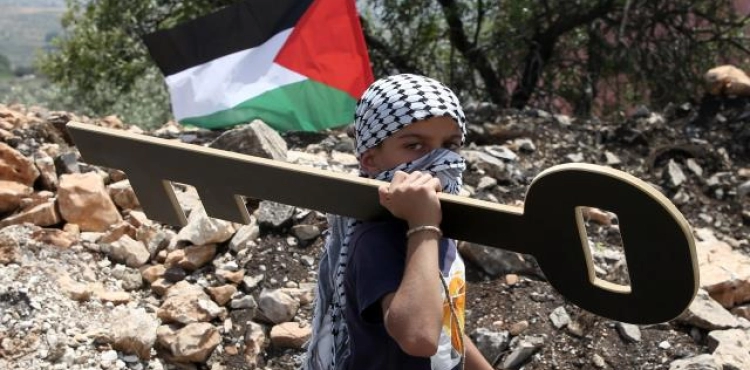A UN memorandum and injuries in confrontations with the occupation.
Citizens mark 72nd anniversary of Nakba with electronic events and raising black flags
Since Thursday evening, the electronic torch has been launched through the page of the national campaign to commemorate the Nakba, marking the beginning of the events of the 72nd anniversary of the Nakba, but this time not a torch that was lit in the streets as every year, but a virtual flame of virtual reality as a result of the state of emergency and the prevailing procedures to confront the new Corona virus "Coved 19".
"The call for this year´s events has been missed by the public, in order to preserve the safety of our people, and we have replaced them with events that guarantee the safety of our people, through events and electronic campaigns, and launched the start of the Nakba events on Thursday evening, electronically, but raised candles to launch this year´s torch in the field in several camps in the West Bank and diaspora camps," said Mohammed Alian, coordinator of the Supreme National Committee for the Commemoration of the Nakba, and chairman of the Supreme National Committee for the Defense of the Right of Return, Mohammed Alian.
Alian stressed that the Corona pandemic is a great danger, but do not forget the greater danger of occupation and what it is practicing against the Palestinian people, as the events came to confirm that 72 years of crimes and suffering.
Since Friday morning, Palestinian flags and black flags (flags of return) have been raised on rooftops, a car equipped with loudspeakers has invited citizens to participate in these events, and murals and banners affirming the right of return have been hung.
At 12:00 p.m. on Friday, 72-second sirens were sounded in the unified adhan network in mosques, television and radio stations, and the movement was suspended for 72 seconds by the number of nakba years, church bells were ringing and mosques grew, local and Arab radio broadcasts a joint broadcast of the Nakba, and activists launched kites decorated with the Palestinian flag and painted black, Friday afternoon, in various governorates.
About 20 representatives of national and factional institutions participated in a stop in memory of the Nakba on Al-Manara Square in downtown Ramallah, coinciding with the sound of sirens and the 72-second suspension of the movement in the number of nakba years, in a symbolic message to confirm that The Palestinians exist and commemorate the Nakba, according to Mohammed Alian.
Alian pointed out that these national figures laid a wreath at the tomb of the late President Yasser Arafat at the headquarters of the presidency in Ramallah to fulfill the occasion, and then a memorandum was delivered to the United Nations through its office in Ramallah.
The memorandum, which was handed over to the United Nations, emphasized the importance of implementing Resolution 194, which affirms the right of return of refugees to their lands, while referring to the exposure of Palestinians through the Nakba, attempts to annex parts of the West Bank by the occupation government, and the decision to confiscate land belonging to the Haram, and the memorandum emphasized the rejection of the "deal of the century" and the rejection of settlement and alternative homeland.
The revival of nakba events was not without confrontations, as a number of citizens were injured during clashes in the town of Al-Sawiya, south of Nablus, during an anti-settlement event on land threatened with settlement on the impact of the nakba commemoration.
The Red Crescent said: "Our teams dealt with dozens of tear gas injuries and were dealt with on the ground, and 6 others were injured by rubber bullets treated on the ground, and recorded a gas bomb in the abdomen that was taken to the hospital, and a gas bomb was carried to a medical center in Kaplan south of Nablus."
The Ministry of Health said: "A minor injury to the abdomen by a tear gas canister and a minor metal bullet in the head, and a hand injury to a tear gas canister led to fractures, all of which reached the Revidia Government Hospital in Nablus from the clashes in the town of Sawiya.
To the east of Qalqilya, dozens of citizens, including children and women, were suffocated by tear gas during the occupation´s crackdown on the weekly, anti-settlement village of Kafr Kaddoum, demanding the opening of the village street, which has been closed for more than 16 years, which was launched to commemorate the 72nd anniversary of the Nakba.
"Israeli soldiers attacked the marchers with live bullets, rubber-coated metal bullets and heavy gas canisters, injuring dozens of people, including women and children, who were treated on the ground," said The Popular Resistance Coordinator in Kafr Kaddoum Murad Shtewi in a press statement.
Israeli soldiers deliberately fired live bullets at citizens´ homes, targeting drinking water tanks on the roofs of these houses, killing two of them, he said.
The March of Kafr Kaddoum was launched with the participation of the villagers to commemorate the 72nd anniversary of the Nakba, affirming the right of the Palestinian people to return, end the occupation and establish an independent State with Jerusalem as its capital.












